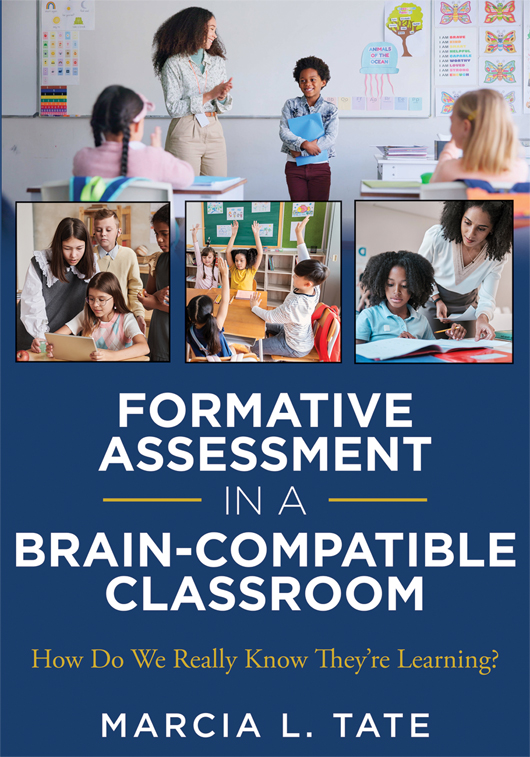Free Reproducibles
Formative Assessment in a Brain-Compatible Classroom
How Do We Really Know They're Learning?
Discover transformative assessment strategies with Marcia L. Tate. From brain-compatible classrooms to effective questioning, empower student comprehension and retention before, during, and after lessons.
Benefits
- Learn how to create a brain-compatible classroom that fosters success and confidence in students when they are assessed.
- Plan lessons so students know what they should know and be able to do.
- Ask effective questions to find out if students are really learning what they should learn.
- Create effective tests.
- Be able to tell before, during, and after lessons what students know.
TABLE OF CONTENTS
Introduction
Chapter 1: What Are the Types of Assessment?
Chapter 2: What Evidence Supports the Use of a Variety of Assessment Types?
Chapter 3: How Can I Create a Brain-Compatible Classroom Environment That Fosters High Academic Achievement?
Chapter 4: How Can I Begin With the End in Mind?
Chapter 5: How Can I Write Quality Selected- and Constructed-Response Test Items?
Chapter 6: How Can Effective Questioning Show That Students Are Learning?
Chapter 7: How Do I Know What Students Already Know Before the Lesson?
Chapter 8: How Do I Know What Students Are Learning During the Lesson?
Chapter 9: How Do I Know What Students Have Learned After the Lesson?
Chapter 10: How Can Checklists Be Used to Assess Student Learning?
Chapter 11: How Can Rubrics Be Used to Assess Student Learning?
Chapter 12: How Do We Know What Students Are Learning When They Work Together?
Chapter 13: How Can Students Peer- and Self-Assess During the Formative Process?
Chapter 14: How Can Students Knock the Top Off Any Test?
Final Thoughts
REPRODUCIBLES
Chapter 1
Chapter 4
- Table 4.1: Comparison of Brain-Compatible Instructional Strategies to Learning Theory
- Figure 4.1: A Brain-Compatible Lesson Plan
Chapter 7
Chapter 9
Chapter 10
- Figure 10.1: A Product/Performance Checklist Template That Teachers Can Use for an Individual Student
- Figure 10.2: An Observation Checklist Template That Teachers Can Use for an Entire Classroom of Students
Chapter 11
Chapter 12
SUGGESTED RESOURCES
BOOKS
- Burke, K. (2010). Balanced assessment: From formative to summative. Bloomington, IN: Solution Tree Press.
- Marzano, R. J. (2010). Formative assessment and standards-based grading. Bloomington, IN: Marzano Resources.
- Tileston, D. W. (2011). Closing the RTI gap: Why poverty and culture count. Bloomington, IN: Solution Tree Press.
- Wiliam, D. (2007). Content then process: Teacher learner communities in the service of formative assessment. In D. Reeves (Ed.), Ahead of the curve: ¬The power of assessment to transform teaching and learning. Bloomington, IN: Solution Tree Press.
- Wiliam, D. (2011). Embedded formative assessment. Bloomington, IN: Solution Tree Press.
WEBSITES

